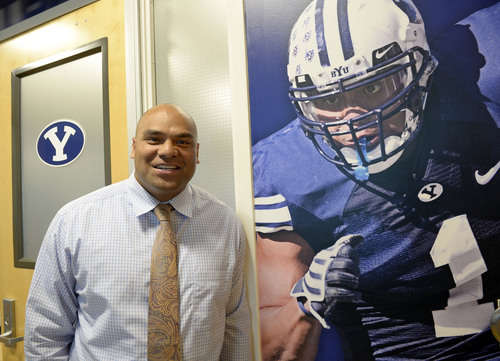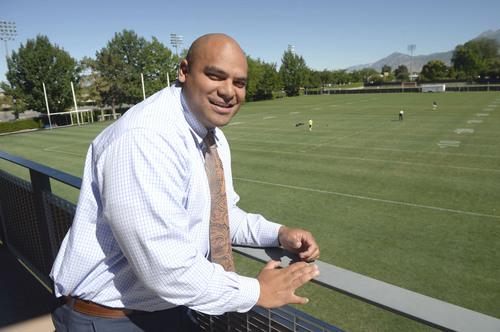This is an archived article that was published on sltrib.com in 2014, and information in the article may be outdated. It is provided only for personal research purposes and may not be reprinted.
Provo • The HBO cameras followed Fui Vakapuna to the parking lot and he drove home, wondering about his NFL future.
And then the call came from the Arizona Cardinals, inviting him to join their practice squad. That's how Vakapuna learned the Cincinnati Bengals were releasing him.
The "Hard Knocks" documentary chronicled Vakapuna's effort to make the Bengals' roster as a seventh-round draft choice from BYU in 2009. It had all the makings of a good story, how the oldest of eight children in a family from Salt Lake City's Glendale neighborhood was fighting for an NFL job.
He made it — eventually, and temporarily. Cincinnati re-signed him in early November and he expected play every week. But he never dressed for a game during his half-season as a member of the Bengals' 53-man roster.
Vakapuna would go through early warmups, only to have coach Marvin Lewis stop by and say, "You're down today" — meaning he was among the team's eight inactive players — in a scene that was repeated every Sunday for nine weeks, plus a playoff game.
Vakapuna's NFL summary: Four teams, four training camps, two practice squads, no games played. He earned considerable money, and can always say he was an NFL player. Statistically, though? He never existed.
"You're almost there, but you're not there," Vakapuna reflected on a summer morning, in his office of BYU's Student Athlete Building. He shook his head, chuckling. "That would have been the cherry on top, to at least play in a game. … It's not a dream story, when you're there."
Vakapuna and his wife, Leonne, were married just prior to his first training camp with the Bengals. And then they were living apart, having signed a housing lease in the Cincinnati area. She stayed there, while he spent two months with the Cardinals' practice squad. And then she moved to Arizona, only to have the Bengals bring him back.
"Everyone thinks it's a glamorous life," she said. "It is, if you're Tom Brady and you're getting paid millions of dollars. … We know how the NFL works now. It's basically a meat market. It's cutthroat."
After that half-season on the Bengals' 53-man roster, Vakapuna spent the next year on injured reserve, was released and joined Indianapolis' practice squad in 2011, and then was signed and waived by the New York Jets with an injury settlement in 2012.
By then, he had started working at ScenicView Academy in Provo, a facility for adults with autism or learning disabilities. "That humbled me a lot," he said. "I'm trying to get a job in the NFL, and their challenge is to get a job at Home Depot or Walmart. Man, I have no complaints."
Vakapuna was hoping for one more NFL shot in 2013, but nothing materialized. In July, with Mark Atuaia having moved into a football coaching position, Vakapuna replaced him as assistant to the athletic director for student services, counseling athletes.
The job fits his outgoing, straightforward personality. "If you're real with them, no B.S., they'll open up," he said.
"He's been a good mentor for me," said BYU tight end Devin Mahina. "I've been able to approach him and just ask him any kind of questions."
There's much to tell from Vakapuna's background. His neighborhood has produced NFL success stories such as Haloti Ngata, Sione Pouha and Will Tukuafu, mixed with less savory characters. Vakapuna dispassionately described being challenged to fight in a parking lot at East High School, where the other guy pulled a gun.
"I was rough on the edges, big-time," he said. "It was a struggle coming out of that neighborhood, but I'm happy I came from there."
Helmets from East, BYU and Cincinnati adorn his office, illustrating his journey, but he's honest about BYU players' NFL chances. When they ask about pro football, "I'll give 'em a statistic," he said. The number is 0.08 percent, NFL.com's odds for any high school player of making the league (college players have a 1.7 percent chance).
Vakapuna believes his ethnic background is helpful to the school. "I think we lost a pipeline with the Polynesian community; we're building that back up," he said.
Yet his work is not limited to Polynesians or other people or color. He's available to all 600-plus men's and women's athletes, with coaches in various sports occasionally asking him to check in with someone who may need help.
Vakapuna is thankful that Atuaia and BYU offensive coordinator Robert Anae intervened on Christmas Eve 2008, when he was intending to enter the NFL Draft as a junior. "That's the first time I grasped that I've got to prepare for my future," he said.
Anae helped him transition from running back to fullback, preparing him for the NFL. Off the field, Vakapuna completed a transformation. His first day as a freshman, Vakapuna opened the door to a 300-seat classroom, then turned and walked away, intimidated. He spent the next hour alone in a locker room.
The episode hardly foretold what he describes as "my happiest moment here at BYU." In April 2009, he passed a final exam in the biology course he had failed as a freshman and earned a degree in sociology.
That's the story he loves to tell about life beyond football. "If I can make it, I know anybody can make it, guaranteed," he said. "I'd never think I'd be in this position, ever."
Twitter: @tribkurt —
About the series
What if you could play one year at the highest level of a sport? How would you view that experience and how would you spend the rest of your life? Utah high school graduates Fui Vakapuna, Zach Sorensen, Brad Sutterfield and Britton Johnsen each realized a lifelong dream, and then his opportunity was gone. These are their stories.
Today • Fui Vakapuna —
About Fui Vakapuna
Age • 30.
High school • East.
College • BYU.
Pros • Cincinnati, 2009 (active roster).
Family • Wife, Leonne; daughter Maiana (23 months).
Job • BYU assistant to the athletic director/student services.
Notable • Vakapuna's brother Tauni was a Utah running back; cousin Fahu Tahi played five seasons for the Minnesota Vikings as a fullback.
Just for practice • Fui Vakapuna spent parts of two seasons on NFL teams' eight-man practice squads, earning about $6,000 per week. By comparison, during the nine weeks he spent on Cincinnati's 53-man roster in 2009, he qualified for a minimum prorated salary of nearly $17,000 per week.





